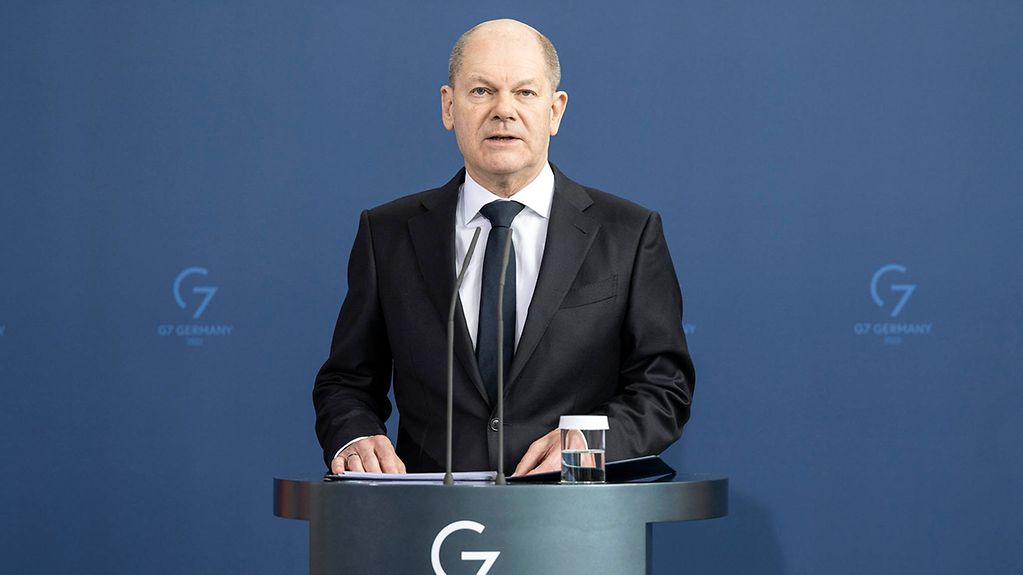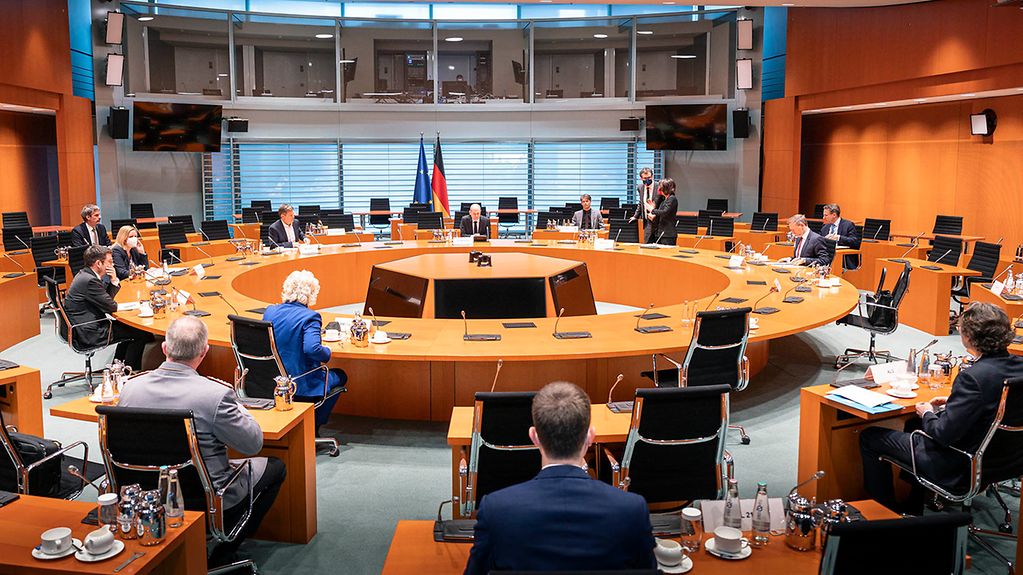Federal Government condemns attack on Ukraine
Federal Chancellor Olaf Scholz has strongly condemned the Russian attack on Ukraine, saying it was “a blatant breach of international law” and was entirely unjustified. He spoke of a dark day for Europe and announced further tough sanctions. He called on the Russian President to withdraw his troops from Ukrainian territory.
4 min reading time

Federal Chancellor Olaf Scholz appealed to Russian President Putin to halt the attack on Ukraine immediately.
Photo: Federal Government/Bergmann
“Today, February 24th, is a terrible day for Ukraine and a sombre day for Europe,” said Federal Chancellor Olaf Scholz in a statement at the Chancellery in Berlin on Thursday.
By attacking Ukraine, Russian President Vladimir Putin was bringing suffering and destruction to his immediate neighbours, said Scholz, and violating Ukraine’s sovereignty and borders. He was also endangering “the lives of countless innocent people in Ukraine, Russia’s sibling nation”, added the Federal Chancellor. Ultimately, the Russian President was also undermining peace on the continent of Europe, stressed Federal Chancellor Scholz.
“There is no justification for any of this. This is Putin’s war,” stated the Federal Chancellor unequivocally. He said he had spoken to Ukrainian President Volodymyr Zelensky on the phone on Thursday to assure him of Germany’s full solidarity with Ukraine and its people.
Meeting of the Security Cabinet
The Federal Chancellor further said that he had convened the Security Cabinet on Thursday morning in view of current developments so that the Federal Government could discuss the situation and jointly decide on the further course of action.
Federal Chancellor Scholz also asked the President of the German Bundestag to convene a special session of parliament on Sunday. “I will issue a government statement on that occasion,” he said.
The Federal Chancellor again urged all Germans who are currently still in Ukraine to leave the country “for their own protection”.

In the morning, the Security Cabinet met to discuss the further course of action after Russia’s attack on Ukraine.
Photo: Federal Government/Bergmann
Further tough sanctions against Russia
As the current holder of the G7 Presidency, Germany advocated a clear and unified response on the part of the world’s most economically powerful democracies. “We the Leaders of the Group of Seven (G7) are appalled by and condemn the large-scale military aggression by the Russian Federation against the territorial integrity, sovereignty and independence of Ukraine, directed partly from Belarusian soil,” says a statement issued by G7 leaders. The attack was “a serious violation of international law and a grave breach of the United Nations Charter”.
The next step to be taken by NATO and the EU this Thursday would be to decide on further tough sanctions against Russia, said Scholz: “It’s a good thing we’ve made careful preparations for this.”
The aim of the sanctions was to make it clear to the Russian leadership that it would pay a bitter price for its aggression, said Scholz, adding that it would become clear to all that “Putin has made a grave mistake with his war.”
Federal Chancellor to Eastern European NATO members: “We will stand by you”
Federal Chancellor Scholz also addressed NATO allies in Eastern Europe. Offering an explicit assurance to Romania, Poland and the Baltic countries, he said: “We understand only too well your concerns in the face of this development. We will stand by you. Germany will uphold its obligation as a member of NATO to provide assistance.”
Together with France’s President Emmanuel Macron, Scholz proposed that the heads of state and government of the NATO states meet very soon to discuss the situation. On Thursday evening, he said, he would travel to Brussels to discuss the further course of action with the EU heads of state and government. “The situation is very serious”.
Russia should halt its attack and withdraw troops
The Federal Chancellor appealed to President Putin to “immediately stop the military offensive, put an end to the bloodshed and completely withdraw his troops from the territory of Ukraine.”
Habeck: a turning point for Europe
Vice Chancellor Robert Habeck described the Russian attack on Ukraine as a “shameless breach of international law”, which Germany condemned in the strongest terms: “The unthinkable has now happened. Russia is attacking Ukraine. We have a land war in Europe – something we thought had been consigned to the history books.” The day was a turning point for Europe and the world, he added, saying that this deliberate Russian aggression would bring suffering to many people.
“Day of shame”
“With its attack on Ukraine, Russia is breaking the most fundamental rules of the international order. The global community will not forget this day of shame for Russia,” said Foreign Minister Annalena Baerbock on the Russian attack on Ukraine. “We will respond together with our partners. Ukraine has our full solidarity.”
The Federal Foreign Office has issued a warning against travel to Ukraine. Federal Foreign Minister Baerbock called on German nationals in Ukraine to leave the country immediately. If it is not possible to leave the country safely, German nationals should stay temporarily in a safe place. The Federal Foreign Office has set up a crisis hotline for German nationals in Ukraine: the telephone number 030 5000 3000 can be reached at any time. Organised transport is currently not possible. The German foreign missions in Poland, Slovakia, Hungary and Moldova are able to provide assistance from the border. Baerbock called on German citizens in Ukraine to sign up on the online crisis preparedness list maintained by the Federal Foreign Office.